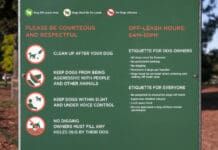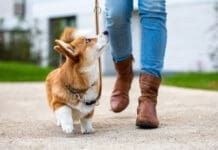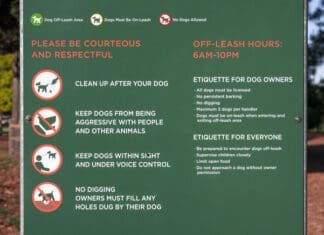Warnings about pets and fireworks are so ubiquitous on social media today, that it seems like repeating the obvious to warn pet owners that they should take extra steps to secure their pets for the holiday. However, there are some fine points to consider that I’d like to add to the suggestions that are most commonly shared.
The warnings all discuss taking various precautions to prevent your pet from being traumatized or escaping on the July 4th holiday. Actually, you had better ramp up those preparations NOW, since many people who buy fireworks start celebrating days in advance! With the holiday on Tuesday this year, I would expect to hear lots of snap, crackle, and pops this weekend.
Every pet safety warning says to make sure your pet is wearing identification. I’d add that you should check – right now! – your dog’s tags to make sure they are still legible. The engraving on many tags gets rubbed off (by the other tags on your dog’s collar) over time, and may not be readable. Also check to make sure that the tag has your CURRENT phone number! Along the same lines, if your dog has a microchip (and why wouldn’t he?!), check with the chip registry to make sure it has your current contact information.
Make sure whatever social plans you have in place for the 4th take your dog’s needs into consideration. If you are going out and leaving your dog at home (very likely the safest and most comfortable and familiar place for him to be), double-check all the doors and windows to make sure they are securely fastened. Consider turning up the TV or stereo to help cover the sounds that your dog might hear. But if your dog has exhibited a serious fear of fireworks in the past – to the point where she has escaped or caused damage in your home – and you won’t be home, she may be safer and more comfortable if she is boarded at a veterinary clinic or kennel (preferably, one with 24-hour staff). It’s rather late to make these reservations, however, so…
If your dog has exhibited extreme fear of fireworks (or gunshots) in the past, though, you may be better off staying home with her and helping her through the experience. Close the doors and windows tightly, and turn up the TV! Some people say that you shouldn’t “coddle” your dog when she’s exhibiting fear, in case you reinforce her fearful behavior. But most animal behavior experts today agree that it’s a good idea to comfort a dog who is shaking or panting in fear. Bring her up on the couch with you, cover the two of you with a heavy blanket (with a fan on you, if necessary!), and turn up the sound of your stereo or TV as loud as you can handle it during the peak fireworks hours. Feed her some tiny, super-delicious treats (if she’ll take them).
Again, if your dog has a past history of dramatic reactions to fireworks, I hope that you have already discussed this with your veterinarian, and received and filled a prescription for an appropriate behavior-modifying medication, such as Sileo. (I’m going to assume that you all know that while veterinarians used to commonly prescribe a tranquilizer, Acepromazine or “Ace”, for treating dogs with fear of fireworks, we now know that this can actually make the dog’s fear worse. Ace sedates the dog but doesn’t reduce his anxiety; he may still be terrified, just unable to move in a coordinated fashion! Many people have reported that their dogs get worse after being treated with Ace while exposed to fireworks.)
If your dog is young, and either hasn’t been exposed to fireworks yet or last experienced them as a very young puppy, you may not even know whether she will be fearful until the day approaches. Arm yourself now with treats – tiny cubes of cheese, canned chicken, roast beef. Any time you hear fireworks popping off in the days before the 4th, try clicking a clicker or using an excited, happy verbal marker such as “Yay!” and run to give your dog a treat. In this way, you can build a happy association between the sound of the explosions and receiving a treat and praise.
Finally, don’t take it for granted that your older dog, who may have never responded negatively to the sound of fireworks before, will keep his cool in the face of the booming or cracking sounds for the rest of his life. A dog’s hearing changes as he ages, and he may register the sounds very differently as a senior dog than he did in middle age. Senior dogs with cognitive losses, too, may be less composed on Independence Day than they once were. Take all the precautions for these precious seniors that you would for a dog with a long history of firework phobias.
Happy 4th! Like most dog owners, I’ll be glad when it’s over!







I should say first that my vet is wonderful and I trust her completely. However, when I asked her to prescribe Sileo, she said it is a dangerous drug and should be avoided for several reasons. I was quite surprised because I had only heard good things, and had good results when i used it in the past. Instead she prescribed 200mg Trazodone twice a day for the duration (through next week), and if necessary, Gabapentin. I have nothing against these drugs, but i don’t think they work as well as Sileo. She will probably prescribe it if I insist, but having read Nancy’s timely article, I thought i’d throw it out here in the comments and see what others think or have experienced, especially those in the veterinary field.